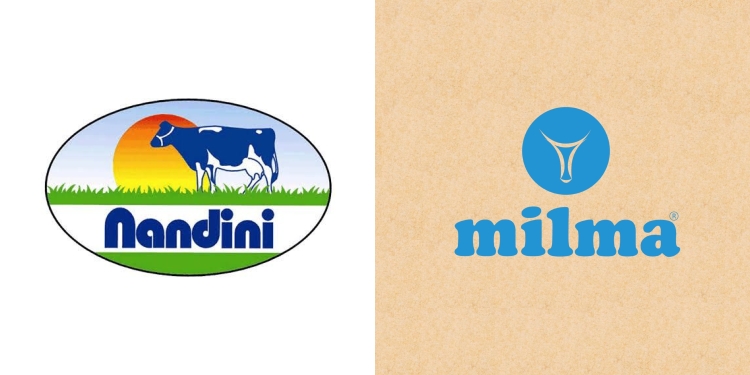Controversies surrounding milk cooperative societies seem to have no end. A few months after the row surrounding GCMMF’s Amul’s entry into the fresh milk space in Karnataka, the bastion of KMF’s Nandini, it is now Nandini’s turn to face the heat in neighbouring Kerala. While some claimed the entry of Amul in the fresh milk market in Karnataka will have an impact on Nandini as a brand, the latter is set to enter Kerala paying no heed to concerns raised on the impact of its entry on KCMMF’s Milma. Nandini has stated plans to open 25 outlets in Kerala by December 2023.
In what is now a familiar refrain, KCMMF claims that entry of Nandini into the Kerala market is unethical practice and it destroys the premise of India’s diary movement. As per media reports, KCMMF has written a letter to Nandini which elicited no response. At the same time, Karnataka’s cooperation minister Kyathasandra Rajanna, speaking to a news channel, said that there is nothing unethical about Nandini doing business in Kerala.
Anyone can sell their products anywhere and it is all about competition; that consumers will choose the product which delivers the best quality, is the argument. Industry watchers too believe that consumers should be given the choice.
We posed: Will a foray in the wake of opposition from the government scar Nandini’s image among consumers in Kerala?

“In today’s world, consumer is God. It is a consumer’s right to have a choice – whether it be an international brand, national brand, regional brand or local brand. Just like consumers have aspirations to choose any brand, companies also have aspirations to expand and cater to various markets. Let consumers and markets decide which brand they want to choose and use, based on the brand’s perceived value. A free market is the best option for consumers and companies,” says Jagdeep Kapoor, Chairman and Managing Director, Samsika Marketing Consultants.

“We are a free trade nation. One basic principle that should be understood whether by Milma, Nandini or any other is that everyone has their right to run a business if the laws and regulations in the country are abided. Karnataka is one of the largest milk procurement states in the country. They are producing milk more than the domestic consumption and they are ensuring the supply of value-added products to other states, which in my opinion is a right thing to do. Amul which has its origin in Gujarat is selling dairy products in other states, the same can be applied to Nandini as well,” notes Hashim Basheer, Head Consultant & COO at Kochi-based business consultancy Wide Verticals.
“The sudden reason why an insecure situation has risen for Milma as a brand – I believe it is part of a propaganda,” adds Basheer.
According to him, the brand feels threatened by the entry of Nandini because of the product quality and transparency in trade relationship which Nandini brings.
“When it comes to brand power and recall, Milma scores in the Kerala market over Nandini because for any Malayalis milk is synonymous with brand Milma. The quality aspect is another debatable topic though. Before all these controversies, Nandini’s Good Life tetra pack entered the Kerala market and the products are available abundantly. Packaging is a problem with milk products, and as a consumer I have faced packaging and spillage issues from Milma, but Nandini’s tetra packs come handy for consumers. There isn’t another brand which has created a market space in Kerala state than Nandini, which claims around 3 pc market share in the domestic milk consumption,” he added.

Sridhar Ramanujam, Founder, Brand-Comm Public Relations, believes that there is a political reasoning behind the controversy.
“The first reaction as a consumer is: how can anybody decide that the brand cannot enter a particular market or the products shouldn’t be sold there? If Nestle or Britannia decides to sell its products in Kerala, will they say that the products cannot be sold in the state? So, how’s a cooperative brand any different from another large well-established cooperative brand in the same space? There was a similar controversy between Amul and Nandini a few months back, similar issues have happened in Tamil Nadu as well. Unfortunately, a lot of issues like these are created by politicians. Politicians are trying to capitalise on anything and raising a bugbear,” he said.

“While more options generally mean good news for consumers, in recent times dairy wars – fought between cooperatives synonymous with states – have acquired a political hue,” observes Jaideep Shergill, Co-Founder, Pitchfork Partners Strategic Consulting.
“The controversy around Amul entering Karnataka in direct competition with the Karnataka Milk Federation’s Nandini brand is the most recent example. It is quite possible that politicians would invoke regional pride to campaign against Nandini in Kerala because it could hurt Milma’s market share and revenues. At stake are the earnings of the lakhs of dairy farmers affiliated to the Kerala Cooperative Milk Marketing Federation. This is bound to spark a pushback and, therefore, impact how consumers view Nandini. However, the aggressive pricing should help Nandini gain a toehold but it will be a long, hard grind against the well-established Milma brand before it can make a significant dent in Kerala. Indian consumers tend to stick with the tried and trusted and Milma is a very trusted name in Kerala. It’ll take more than lower prices to make Kerala’s consumers switch over the long term,” he explains.
How can Milma hold fort?
Basheer points to how Milma can tackle the competition.
“There arises a question whether Milma as a brand was able to expand its business horizon beyond milk, which has to be thought through by the government and the brand. In my opinion, Milma has failed to tap and utilise the brand image and popularity it has built over the years, with the right form of marketing and consumer strategies. Milma has been enjoying a monopoly. The problem with monopoly business is that the operators enjoy the freedom to dictate the norms, but consumers should be given the power and choice. With the right brand communication, quality products, pricing, and marketing strategies, Milma can tackle the issue,” says Basheer.
“Nandini is a well-run co-operative and has quality products which are popular among consumers. Milma should try to run the brand as efficiently as Nandini rather than complain that the latter is selling products at a lower rate. There should be competition in all sectors; more the players, greater the choice consumers will have. All these controversies are short lived and will not have any impact on the brand image, especially if it’s a legendary brand. There will not be long-term implications,” concludes Ramanujam.

















